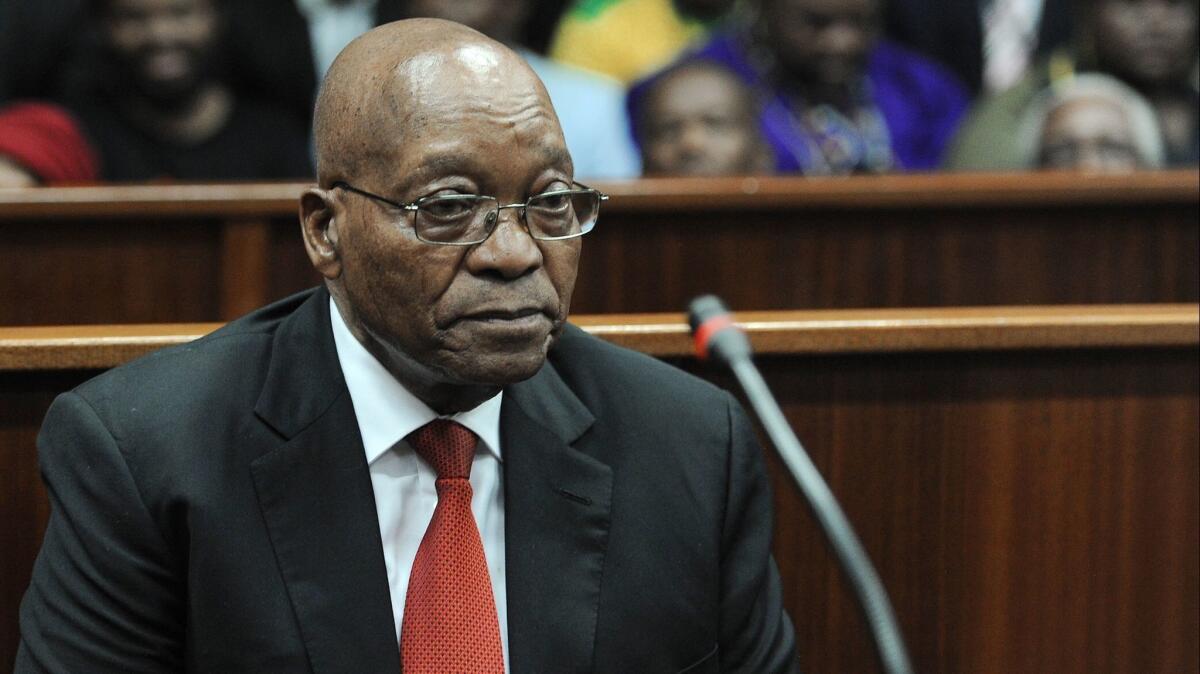Former South African President Jacob Zuma tells crowd he’s innocent after court appearance on corruption charges

- Share via
Reporting from Johannesburg, South Africa — Former South African President Jacob Zuma told cheering supporters he was not guilty of corruption after appearing in KwaZulu-Natal High Court on Friday, two months after his party, the African National Congress, forced him from office.
In a sign the corruption case against the 75-year-old Zuma could go on for years, prosecutor Billy Downer said Zuma’s legal team planned to challenge the legitimacy of the prosecution, which involves the reinstatement of charges of fraud, racketeering and money laundering that had been dropped years ago, and to seek a permanent stay.
Although Downer said authorities were ready to proceed with a trial in November, the challenge and request for a stay of prosecution could each take months, especially if appeals are pursued.
The case at the Durban courthouse was adjourned until June 8 on the agreement of both parties to enable Zuma’s defense legal team to prepare their documents for the challenge.
One controversial aspect of Zuma’s case is its funding by taxpayers, enabling his lawyers to mount successive appeals and challenges — a legal strategy dubbed in South African media as Zuma’s “Stalingrad” approach, a reference to his lawyers’ determination to fight for every yard of legal turf, however long it takes.
Zuma looked tense at times, sitting in a dark suit on the court bench behind his lawyers. He is charged with 16 counts of corruption, fraud, money laundering and racketeering in relation to 783 payments he allegedly received as part of a South African arms deal in 1999, when he was deputy president. Also facing prosecution was Thales, a French arms company whose South African affiliate was formerly known as Thint, which was accused of bribing Zuma.
Zuma’s appearance so soon after leaving office was striking in a continent with a history of top officials in various countries being criticized for corruption, sometimes running into tens of millions of dollars, but where few ex-presidents have faced justice.
Since being ousted by the ANC and then replaced by his former deputy Cyril Ramaphosa in February, Zuma has claimed the prosecution amounts to an attack by political enemies.
Zuma said nothing in his court appearance but spoke to supporters in Zulu on a stage outside the courthouse, saying the charges were political and that he was being persecuted because he had exposed the lack of freedom in South Africa.
“The truth will come out. What have I done? I am innocent until proven guilty,” Zuma said. “I can’t believe all the lies about me.”
He criticized the ANC, which banned his supporters from wearing party colors, clothing and regalia at his trial to support him. He said when he asked for answers about what had been done to him, no one was willing to talk to him.
“Why am I being treated as if I’m guilty?” he said.
The ANC leadership last month said members could support party figures facing trial, but ordered them not to wear the ANC’s green, black and yellow colors. It was an order ignored by Zuma’s supporters Friday.
Zuma told supporters he had been betrayed by people he trusts, an apparent reference to Ramaphosa and his supporters who forced Zuma from power.
“They are fighting me because I said there is no freedom. That’s why they take me to court. They want to shut my mouth,” he said, calling for radical economic transformation and the return of land from white people to black South Africans.
He ended by dancing and singing a song in Zulu: “I am wounded by people I grew up with.”
Thousands of Zuma supporters marched in Durban’s streets after his court appearance. Earlier, supporters held an overnight prayer vigil outside Durban’s High Court in KwaZulu-Natal, a stronghold for Zuma.
The case against Zuma has been a long time coming. It came after his financial advisor Schabir Shaik was found guilty of fraud and corruption in relation to the arms deal and alleged corrupt dealing with Zuma in 2005. Zuma was sacked as deputy president and two years later was charged.
At that point the charges seemed likely to crush Zuma’s ambition to be president. But after he became leader of the African National Congress in December 2007, the case against him began to topple.
Just weeks before the 2009 parliamentary election, the head of the National Prosecuting Authority at the time, Mokotedi Mpshe, abruptly dropped the charges, removing the political barriers for Zuma to become president. Later that year, the opposition Democratic Alliance launched an application that the decision to drop the charges be reviewed in the courts.
In 2016, the High Court ruled that Mpshe’s decision to drop the charges was irrational and ordered the charges be reinstated. Last year Zuma lost a Supreme Court appeal against that decision.
Some legal analysts say Zuma’s chances of successfully challenging the legitimacy of the prosecution have no chances of succeeding.
Constitutional lawyer Pierre de Vos tweeted that a court had already ruled that the decision to prosecute Zuma was valid. He believed Zuma’s chances of appeal had “zero chance of success” and amounted to an abuse of legal process.
Twitter: @RobynDixon_LAT
More to Read
Sign up for Essential California
The most important California stories and recommendations in your inbox every morning.
You may occasionally receive promotional content from the Los Angeles Times.










